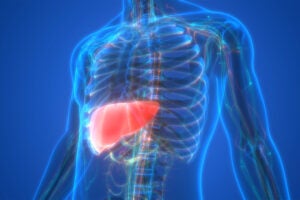Tag: nervous system
-
Science & Tech
If it ain’t broke, don’t fix it
Research suggests that errors resulting from variability in motor function are a feature, not a bug, of our nervous system and play a critical role in learning.
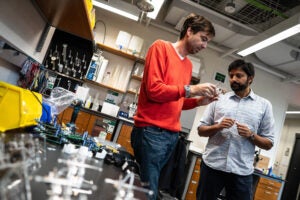
-
Health
Inconsistent? Good
Though variability is often portrayed as a flaw to be overcome, Harvard researchers now say that, in motor function, it is a key feature of the nervous system that helps promote better or more successful ways to perform a particular action.
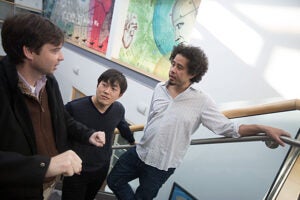
-
Health
‘Brainbow,’ version 2.0
Led by Joshua Sanes and Jeff Lichtman, a group of Harvard researchers has made a host of technical improvements in the “Brainbow” imaging technique.
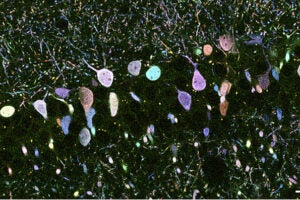
-
Campus & Community
A look inside the lab
The Faculty of Arts and Sciences’ Division of Science recently relaunched its “Science Research Lecture Series,” aimed at introducing the broader local community to research conducted by Harvard faculty members. The talks will be held once a month in the Science Center, and will be open to the public.
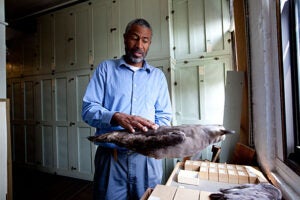
-
Campus & Community
First Santiago Ramón y Cajal Professor is named
Jeff Lichtman, the Jeremy R. Knowles Professor of Molecular and Cellular Biology, has been appointed as the first Ramón y Cajal Professor of Arts and Sciences.
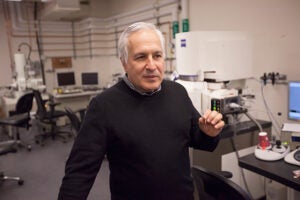
-
Health
Deciding to go left or right
Researchers in a Harvard lab have developed a device, dubbed LADY GAGA, that allows them for the first time to precisely control airborne scents. They have used the device in their work unraveling how animals make navigational decisions based on their environment.
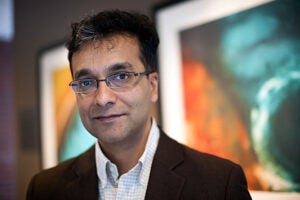
-
Health
Making the worms turn
Biophysicist Aravinthan Samuel has developed new techniques to monitor and influence the behavior of roundworms to learn how their basic nervous systems work, a first step to understanding the circuitry in more complex creatures, like humans.

-
Health
The nose knows
Harvard researchers have shed light on how the sense of smell works to induce behavior, linking patterns of electrical spikes in the brain to behavior in laboratory animals.
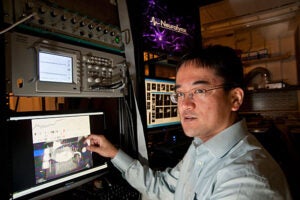
-
Health
Stem cells open window on disease processes
A panel of Harvard Stem Cell Institute experts said recently that stem cell research’s biggest impact on patients’ health likely won’t come from therapies that inject stem cells or implant…
-
Campus & Community
Growth of spinal nerves is improved
Nerves that control the highest level of voluntary movements have been isolated and secrets of their growth revealed for the first time. During development, these nerves extend themselves from the…
-
Health
Harvard Medical School signs agreement with Merck to develop potential therapy for macular degeneration
Harvard Medical School announced May 23, 2006 that is has signed a multimillion-dollar license agreement with Merck & Co. Inc. to develop potential therapies for macular degeneration, an eye disease…
-
Campus & Community
HMS researchers isolate nerve growth compound
Researchers at Harvard Medical School and Children’s Hospital Boston have isolated a molecule that stimulates the regrowth of damaged adult nerve fibers, providing new hope for those suffering from nerve…
-
Health
Dendritic spines don’t go with the flow
Neurons receive incoming signals through synapses at hundreds of dendritic spines, the lollipop-shaped structures with thin necks and bubblelike heads that stud the surface of dendrites. Each spine serves as…
-
Health
Barrier found to nerve regeneration
Scientists have long dreamed of prompting adult neurons of the central nervous system to regenerate. But these cells have the deck stacked against them in several ways. Molecules from the…
-
Health
Gene clue to brain asymmetry revealed on right side
Although many assumed that the asymmetry-producing genes, when found, would be more highly expressed on the left side of the brain than the right, Sun Tao, Christopher A. Walsh, and…
-
Campus & Community
Decoding the babel of brain cells
If brain cell messages could be separated from the “noise” of other brain activity and clearly understood, researchers would be closer to repairing damage caused by a number of nervous…
-
Health
First view of many neurons processing information in living brain
A Harvard Medical School (HMS) research team used a new technique to obtain the first close-up look at the neural circuits that produce vision in cats and rats. “Put simply,…
-
Health
Brake on Axon regrowth discovered
Since nerve cell axons in the mature central nervous system do not regrow, neurologists have no way of fully treating paralysis due to injury. “About a hundred years ago, people…
-
Health
High levels of Epstein-Barr virus antibodies in women linked to risk of multiple sclerosis
Multiple sclerosis is a chronic degenerative disease of the central nervous system. Nationwide, there are an estimated 250,000 to 350,000 people with MS. Researchers have long wondered how MS develops…
-
Health
First domino falls in research on sense of touch
Unlike the other four senses, touch is ubiquitous, involving sensory terminals dispersed over the outside and on the inside of the body. This system encodes a variety of sensations in…
-
Health
Gene for familial dysautonomia discovered
Familial dysautonomia is a neurodegenerative disease that mainly targets Ashkenazi Jews. The disease, which affects one in every 3,600 members of this group, impairs the development of the sensory and…


